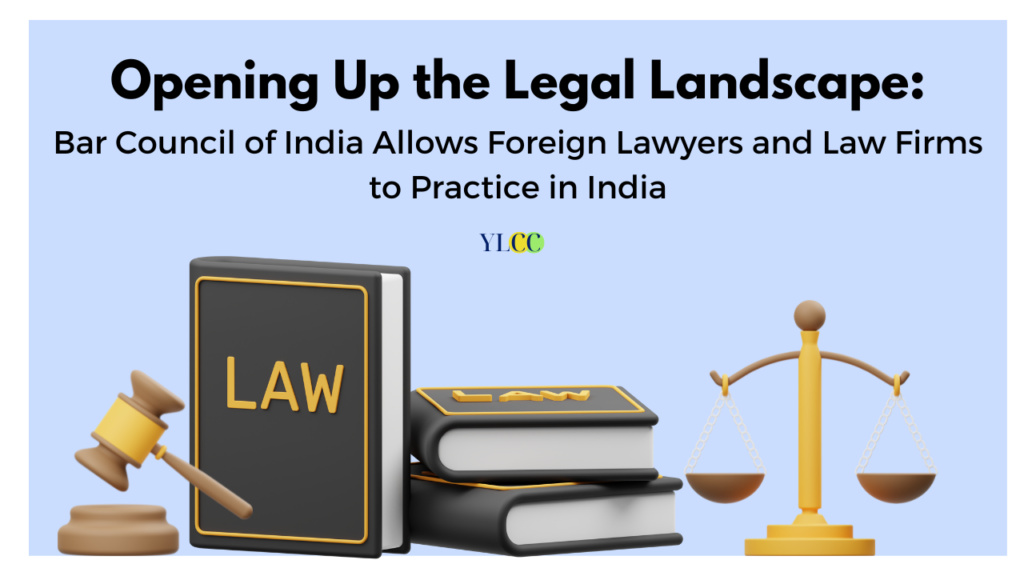
Introduction
India is the world’s second most populous country and one of the fastest-growing economies, making it an attractive destination for foreign businesses and investors. With this growth, there has been an increased demand for legal services, leading to a rise in the number of foreign lawyers and law firms wishing to practice in India. In recent years, the Bar Council of India (BCI) has taken steps to facilitate this process, allowing foreign lawyers and law firms to practice in India under certain conditions and guidelines.
This article will provide a comprehensive overview of the BCI’s regulations and guidelines for foreign lawyers and law firms practicing in India. We will discuss the eligibility criteria for foreign lawyers and law firms, the process of registration, the permitted scope of legal work, and the ethical and professional standards that must be maintained while practising law in India. Overall, it aims to provide valuable information for foreign lawyers and law firms looking to expand their practice in India, as well as those interested in understanding the legal landscape in one of the world’s most dynamic economies.
BCI rules for registration of foreign lawyers in India
The Bar Council of India (BCI) has laid down rules and guidelines for the registration of foreign lawyers in India. As per these rules, foreign lawyers can practice in India under certain conditions and guidelines. The primary objective of these rules is to ensure that foreign lawyers who wish to practice in India meet certain eligibility criteria and comply with certain regulations.
The BCI has notified the Bar Council of India Rules for Registration and Regulation of Foreign Lawyers and Foreign Law Firms in India, 2022. You can read the rules here (click here). These regulations stipulate that foreign lawyers and law firms may engage in transactional or corporate work, such as joint ventures, mergers and acquisitions, intellectual property matters, and contract drafting on a reciprocal basis. However, they are not permitted to undertake conveyancing of property, title investigations, or other similar tasks.
Key pointers:
- Foreign lawyers and law firms seeking registration in India must meet certain eligibility criteria. They must be qualified to practice law in their country of primary qualification, and their country must permit Indian lawyers to practice law in its jurisdiction on a reciprocal basis. Additionally, they must not have a criminal record or disciplinary action taken against them in their home country.
- Foreign lawyers and law firms may engage in several arenas of legal practice in India, including providing legal advice and opinions on the laws of their country of primary qualification, representing clients in international arbitration cases in India, and providing legal expertise and advice to clients before non-court bodies where knowledge of foreign law is essential. They may also provide legal expertise and advice on various international legal issues, but are not permitted to represent clients or prepare documents for Indian courts, tribunals, or other statutory authorities.
- Foreign lawyers and law firms registered in India are subject to the same code of conduct and disciplinary proceedings as Indian lawyers. If found guilty of misconduct, their registration may be revoked, and they may be subject to other consequences as prescribed by law. However, foreign lawyers or law firms who are enrolled with any State Bar Council in India and are partners or associates in a foreign law firm registered in India may advise on non-litigious matters and issues relating to countries other than Indian law, but are not permitted to appear before courts, tribunals, or other statutory or regulatory authorities.
- According to the Rules, a foreign lawyer or foreign law firm is not allowed to practice law in India unless they are registered with the Bar Council of India. However, this prohibition does not apply to ‘fly in and fly out’ practice, which should not exceed a total of 60 days in any 12-month period. The Advocates Act was interpreted by the Supreme Court in 2015 to permit foreign lawyers to engage in ‘fly in and fly out’ practice. This practice allows foreign lawyers to act as counsel in international commercial arbitration cases involving foreign law. It is important to note that the limitations placed on foreign lawyers and law firms will also extend to Indian lawyers who are working with foreign law firms.
- To apply for registration, a foreign lawyer or foreign law firm must submit “FORM A,” along with the required registration fee and non-refundable processing charges. The registration fee is USD 25,000 for an individual foreign lawyer and USD 50,000 for a foreign law firm, private limited partnership, company, or Limited Liability Partnership (LLP).
- In addition to the registration fee, a security deposit or guarantee amount is required. For individual foreign lawyers, the security deposit is USD 15,000, and for foreign law firms, private limited partnerships, companies, or LLPs, the guarantee amount is USD 40,000.
Documents accompanied by the form
The registration application form should also be accompanied by several documents, including a certificate from the Union Law Ministry and Ministry of External Affairs confirming the existence of an effective legal system in the foreign country of primary qualification and that the applicant has no objection to being registered under these Rules and practicing law in India. Additionally, the Competent Authority of the foreign country of primary qualification must provide a certificate certifying that the applicant is eligible to practice law in that country.
The following documents are required to be submitted along with the application for registration of a foreign lawyer or foreign law firm with the Bar Council of India:
- A certificate from the government of the foreign country of primary qualification or a competent authority stating that advocates enrolled under the Advocates Act, 1961 are permitted to practice law in that country in a manner comparable to the law practice permitted under these rules, along with copies of relevant laws and rules.
- A certificate from the competent authority of the concerned country of primary qualification, or any other competent authority such as courts, bar associations, bar councils, etc., stating that the applicant has been in practice in that country.
- A certificate of the competent authority of the concerned foreign country of primary qualification that gives details of the fee structure and other amounts chargeable from an advocate enrolled under the Act to practice law in that country, along with relevant rules and laws.
- A “no objection certificate” from the competent authority of the concerned foreign country of primary qualification, stating that it has no objection in case the applicant starts law practice in India and that the applicant enjoys a good standing in the Bar.
- A declaration on affidavit that the applicant has not been convicted of any offence and has not suffered any adverse order in any disciplinary matter. In case of a conviction/adverse order, copies of the order of conviction/adverse order and other related documents such as appeal and stay, if any, or sentence/fine suffered/paid must be annexed.
- A declaration on affidavit that the applicant has no objection and consents to the making of enquiries and investigation by the Bar Council of India on its own or through such government or non-government investigating agency, as it may deem fit, to verify the veracity of the particulars disclosed by the applicant in the application and genuineness of the documents annexed therewith.
- An undertaking on oath that he/it shall not practice Indian law in any form or before any court of Law, Tribunal, Board or any other Authority legally entitled to record evidence on oath.
- A declaration on oath that he/it shall not be entitled to and shall not claim any interest on the guarantee amount deposited by him/it with the Bar Council of India at the time of registration under these Rules and that the Bar Council shall be entitled to adjust and apply this guarantee amount to the penalty and cost amounts that may be awarded by the Bar Council of India under the provisions of these Rules.
- A declaration on oath that the applicant fully understands and appreciates the fact that on registration under rule 7 of these Rules, the Advocates Act, 1961 and Rules made thereunder, mutatis mutandis, apply to him/it in respect of law practice by him/it in India and that he/it is subject to the jurisdiction of Courts of Law in India and to the jurisdiction of Bar Council of India in relation to such practice.
The registration of a foreign lawyer or foreign law firm with the Bar Council of India is valid for a period of five years, and renewal can be done by filing an application for renewal in Form B within six months before the date on which such validity expires. It is important to note that the restrictions on foreign lawyers and law firms will also apply to Indian lawyers working with foreign law firms.
Code of conduct for foreign lawyers
Foreign lawyers practicing in India are required to adhere to the same code of conduct as Indian lawyers. They must maintain professional integrity, avoid conflict of interest, and ensure confidentiality of client information. They must also ensure that they do not engage in any unauthorized practice of law and comply with all the laws and regulations applicable in India.
Disciplinary proceedings for foreign lawyers
If a foreign lawyer is found to have violated the code of conduct, the BCI may initiate disciplinary proceedings against them. These proceedings may involve the appointment of an inquiry committee to investigate the misconduct, followed by a hearing before the disciplinary committee. The foreign lawyer may be given an opportunity to defend themselves and provide evidence in their defence.
Consequences of misconduct for foreign lawyers
If a foreign lawyer is found guilty of misconduct, the consequences may include revocation of their registration to practice in India. In addition, they may also be subject to penalties and fines. It is important for foreign lawyers practicing in India to understand and comply with the BCI rules and regulations to avoid any legal consequences.
Conclusion
In conclusion, the Bar Council of India has opened up the Indian legal market to foreign lawyers and law firms. This move has not only increased the scope of legal services available in India but has also provided foreign lawyers and law firms with an opportunity to tap into one of the fastest-growing economies in the world. As of September 2021, 302 foreign lawyers and 76 foreign law firms have been registered with the Bar Council of India, indicating a growing interest in the Indian legal market. However, it is important to note that foreign lawyers and law firms are subject to certain restrictions and regulations, and must comply with the rules and guidelines set forth by the Bar Council of India. Overall, the decision to permit foreign lawyers and law firms to practice in India is a positive step towards increasing access to legal services and promoting international cooperation in the legal profession.
YLCC would like to thank Nikunj Arora for his valuable insights into this article.






